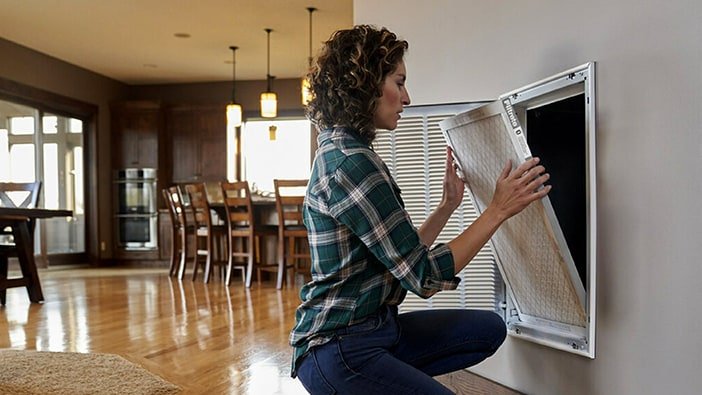Table of Contents
A heat pump provides your home with efficient, reliable indoor temperatures throughout the year. But what happens when your heat pump freezes up? If your heat pump is frozen and not working, you may be wondering about the causes and possible solutions. From blocked air filters to a dirty system, there are a variety of things that can lead to a frozen heat pump.
In this article, we’ll explore what causes a heat pump to freeze up and examine some possible solutions. Keep reading to learn how you can get your heat pump running again if it keeps freezing up.
Poor Airflow
A clogged air filter is one of the most common causes of a frozen heat pump. A clogged air filter prevents the air from flowing properly through the system, resulting in a decrease in air pressure and a decrease in air temperature. This decrease in temperature can cause the heat pump to freeze up, as the air cannot escape the system. To prevent a clogged air filter from causing a frozen heat pump, the filter should be inspected and changed regularly. It is suggested that homeowners change HVAC air filters at least every 90 days.
Additionally, shrubs, debris, and other items can block off the outside unit and prevent adequate airflow. As part of your routine home maintenance, you should prune the trees and shrubs around your unit and ensure that it is clear of any obstructions.
Low Refrigerant
Low refrigerant is a common cause of frozen heat pumps. When there is an inadequate amount of refrigerant in the system, the liquid line can become too cold, causing it to freeze and the evaporator coil to become frosty. This can prevent the heat pump from functioning properly and can lead to expensive repairs.
The most common cause of low refrigerant is a leak in the system, which can be caused by damaged or aging pipes or a faulty compressor. If a leak is present, the refrigerant will slowly escape and cause the system to become undercharged. Other possible causes of low refrigerant include improper installation, incorrect sizing of the unit, or a manufacturing defect.
In order to diagnose and address a frozen heat pump due to low refrigerant, a technician must first confirm the presence of a refrigerant leak. This can be done with a pressure test or a leak detection dye test. Once the leak has been identified, it must be repaired, and the entire system must be recharged with the proper amount of refrigerant. This is a task that a qualified technician should only do as incorrect recharging could cause further damage to the system.
Dirty Evaporator Coil
The evaporator coil is the component of the heat pump that absorbs the heat from the air in the home and transfers it to the refrigerant that is circulating throughout the system. If the evaporator coil is dirty, it will not be able to absorb the heat efficiently, leading to an increase in the temperature of the refrigerant. This can cause the refrigerant to become too cold and cause the heat pump to freeze up.
The solution to a frozen heat pump due to a dirty evaporator coil is to clean the unit. This can be done by turning off the power to the heat pump and then removing the cover of the unit. Carefully inspect the evaporator coil for dirt and debris, and if any is present, use a shop vac to remove it. Once the evaporator coil is clean, replace the cover and turn the power back on. The system should now be able to work properly. Having seasonal maintenance performed by an HVAC technician annually will also ensure that your system is clean and efficient.
Overall, a frozen heat pump is a serious issue that can cause a great deal of disruption and damage if not addressed quickly. Understanding the causes and solutions of a frozen heat pump is essential in order to prevent or resolve the issue. Taking the necessary steps to prevent or fix the issue will ensure a comfortable, safe environment for everyone.

